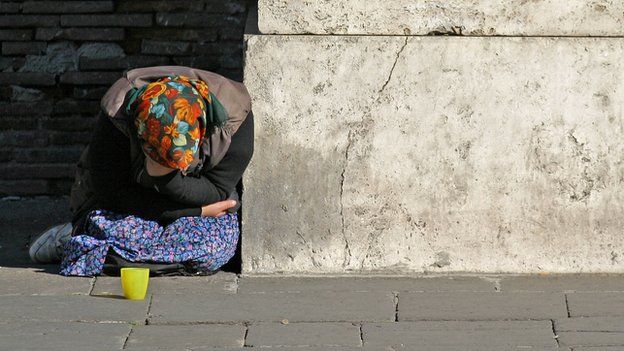'It's a matter of dignity'
- Published

The struggle many homeless women face in accessing sanitary products inspired the Homeless Period campaign. Its petition for tampons and sanitary towels to be made available for free has attracted more than 100,000 signatures. And it has led two young women from Hertfordshire to get directly involved.
Hundreds of packs of tampons and sanitary towels fill Sanya Masood's living room.
The 24-year-old along with her friend Sophie Harrold, also 24, has been collecting these donations for a shelter after hearing about the Homeless Period campaign in the UK. They will be sent to a homeless shelter in Liverpool.
The friends say they became involved because they "are feminists". They received donations of tampons and sanitary towels from friends, through Facebook and by word of mouth over the last month.
Sanya said: "We see sanitary products as a necessity so the government should provide shelters with an allowance to buy them.
"Condoms are funded for homeless people, but a lot of charities are relying on donations when it comes to things like tampons."
Sophie added: "It's a hygiene issue and a matter of dignity that homeless women are given these by the government.
"I have read stories of these women keeping their tampons in for too long to save money, and with Toxic Shock Syndrome, that is a concern."
Toxic Shock Syndrome is a rare but life-threatening bacterial infection. For reasons that are not fully understood, a significant proportion of cases occur in women who are on their period and using a tampon, particularly tampons that are designed to be 'super absorbent'.
Social media campaign
Government "street counts" in 2014 estimated around 2,744 people sleep rough on any one night across England, up 5% from 2010. It's unclear how many are women. But the charity Crisis suggests this is only a snapshot, and the actual figures are likely to be much higher.
In Scotland, in 2014-15, 35,764 people made homelessness applications to local authorities. Around 23,800 (66%) were single people, of whom around 16,200 were men and 7,600 were women. Wales and Northern Ireland do not issue comparable statistics.
The Homeless Period campaign was started by Josie Shedden, Oli Frost and Sara Bakhaty who met at a London advertising agency. They were horrified after reading about the experiences of some homeless women on their periods.
They used social media - and the story of a woman called Patricia who used to sleep rough in Brixton - to spread awareness of the issue.
Patricia had reported using a cloth when homeless and on her period and said: "I used to feel very depressed. It used to get me down.
"Why does a woman have to rip up a cloth and put it between her to stop herself from bleeding?"
Once a petition gets more than 100,000 signatures, it can be debated in parliament.
Sara Bakhaty said "We never expected such a response to the petition. We are glad we're inspiring people to donate.
"The next stage is approaching MPs to see if they support government funding in this area."
'Raising awareness'
A spokesman for the Department of Communities and Local Government said: "We have increased spending to prevent homelessness, making over £500m available to local authorities and voluntary sector to support the most vulnerable in society and put strong protections in place to guard people against the threat of homelessness in their local areas.
"It is for hostels to determine how best to use funding and what services are required to meet the needs of their service users."
The Marylebone Project in London is one of the biggest hostels for homeless women in England.
One of the women staying there said: "The problem with being homeless on your period is you don't have the budget for everything."
The 31-year-old added: "My period is not very regular and sometimes it would just start and I would end up using tissue."
Sharon Poon, centre manager at the Marylebone Project, said: "The best thing about this petition is that it's raising awareness of an issue that has been not spoken about very much before.
"We do rely on donations, and we give whatever products that we get such as shampoos and towels to the ladies here. We don't often get sanitary towels."
She added: "Even if the government doesn't step in here, the petition is still a success because it's raised awareness.
"The struggle many homeless women face in accessing sanitary products inspired the Homeless Period campaign. Its petition for tampons and sanitary towels to be made available for free has attracted more than 100,000 signatures.
"It has led these two young women from Hertfordshire to get directly involved - and it might encourage the companies who make sanitary products to donate."
- Published21 August 2015